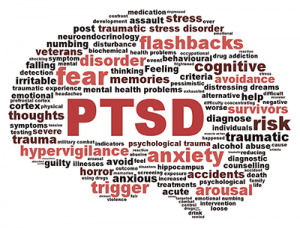
Mindfulness has become a big buzzword in psychology these days. From working with borderline personality disorder to depression and anxiety, researchers are finding that its uses range far and wide. Given this, it is no wonder that research is starting to show that mindfulness can also help in the treatment of Post Traumatic Stress Disorder (PTSD). But before I jump in, a little explanation is in order . . .
What Exactly Is Mindfulness?
In some ways mindfulness is incredibly simple. It has been defined as awareness of present moment experience with acceptance and kindness. The learning of mindfulness often involves a structured practice where one focuses on the breath as an anchor to the present moment, and allows thoughts, feelings, and body sensations to arise, which staying with the breath. The mindfulness practitioner also greats what arises with non-judgment, acceptance, and kindness, and allows them to naturally come and go, returning to the breath each time they realize they have wondered off. However, though the concept is simple, integrating the power of mindfulness into one’s everyday life can be very subtle and quite challenging. This is why learning mindfulness benefits from having a teacher.
What Does Mindfulness Do?
The effects of mindfulness are broad in scope. Many report a shift in their relationship to their emotions; that they are no longer so afraid of facing and feeling difficult emotions because they know they will pass. Some share that their relationship with themselves shifts; that they notice meeting their own difficulties and shortcomings with kindness and compassion more often than negative judgment. Some experience much more conscious choice around their behavior and reactions to things, which leads to a greater sense of freedom. Others simply report an increased sense of peace and calm in their lives.
Mindfulness and PTSD
Recently, a collaborative study from the University of Michigan Health System and the VA Ann Arbor Healthcare System, focusing on war veterans, discovered that mindfulness based treatment was more effective than standard treatment for PTSD (exposure therapy and EMDR). Anthony P. King, Ph.D., the lead author on the study, noted that, “The results of our trial are encouraging for veterans trying to find help for PTSD.” One of the most noticeable areas of improvement for the individuals receiving mindfulness-based treatment was a reduction in avoidance symptoms. A big part of PTSD can include avoidance and suppression of painful emotions and memories, because they become overwhelming to the individual. While a good coping mechanism, this type of avoidance can also make matters worse in the long-term because what gets pushed down inside often gets bigger and gains power.
Mindfulness helps one to allow things to naturally arise, and be with what arises internally with kindness and compassion. Mindfulness also helps to increase one’s awareness of what is happening on the inside. This awareness combined with the acceptance and kindness helps one expand their window of tolerance (what their nervous system is able to tolerate) and thus increases their ability to allow some of the painful feelings and memories to come up and move through.
Further Findings . . .
PTSD also deeply affects one’s perception of the world, creating a lens or filter which highlights danger and risk and removes safety and calm. Over time this becomes the reality of a PTSD sufferer, and confusion and self-blame often set in. I have noticed that when trauma survivors first walk in they tend to be asking, “What is wrong with me?” and have come to the conclusion that it must be some personal fault.In the case of PTSD, what is often going on is a traumatic experience that has literally rewired the brain and jacked up the nervous system.
Mindfulness is very effective at slowly and gently removing the filters with which we view the world and ourselves, and it show us a clearer image of what is really going on.
With clear understanding often comes compassion. The study mentioned above also found that the participants experienced a decrease in feelings of self-blame and a decrease in perception of the world as a dangerous place.
In my own practice as a psychotherapist, working with trauma survivors with or without PTSD, I have found mindfulness to be an invaluable asset. It brings attention to the present moment and away from overwhelming memories and feelings, and allows one to heal and transform past trauma so that it no longer has such a debilitating power over them.
If you suffer from PTSD, have a history of trauma, or are simply curious about the benefits of mindfulness, I encourage you to take a step and seek out a mental health professional with mindfulness expertise.
Dan Entmacher MA, LPCc


You seem so unafraid, uaahsnmed and so sure about life. I wish I could get to that stage in my life where I could be unafraid, uaahsnmed and so sure. Would you mind being my mentor? I’m still 28 and just recently married with many emotional scars (many imagined – I feel, but still hurtful) that I haven’t fully recovered from and leave me awkward with people and social situations. Would love to contact you through email if that’s possible. Only if you don’t mind that is. =0)Take care and God Bless You…
Hi Nino,
Thanks for your post. I would be happy to chat and see how I might be able to help. Just send an email to Dan@DanEntmacherPsychotherapy.com and I’ll get back to you there. Take Care.